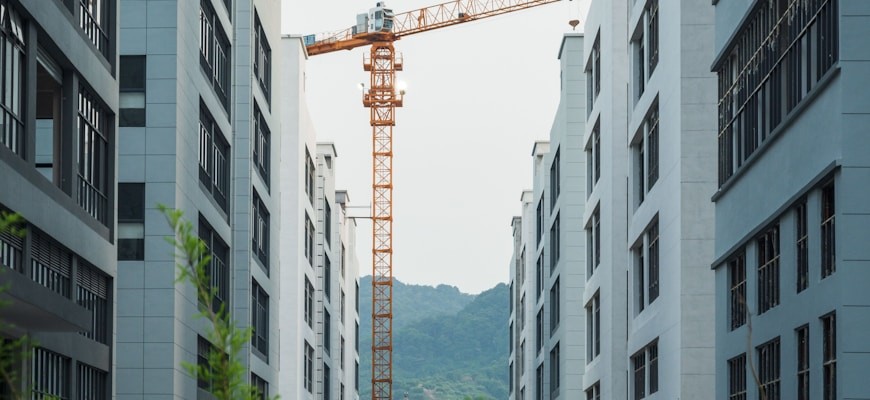- Understanding RWA: A Game Changer for Real Estate
- The Role of RWA in Shaping Modern Real Estate Practices
- How RWA is Revolutionizing Property Transactions
- RWA’s Influence on Real Estate Market Trends
- Challenges and Opportunities: RWA in Real Estate
- Future Prospects: RWA and the Evolution of the Real Estate Sector
Understanding RWA: A Game Changer for Real Estate
Real estate is undergoing a transformative shift with the introduction of Real World Assets (RWA). This innovative concept refers to tangible assets, such as properties, that are digitized and represented on blockchain platforms. The significance of RWA in the real estate sector cannot be overstated, as it introduces unprecedented efficiency and transparency in transactions.
One of the primary benefits of RWA is the democratization of real estate investment. By tokenizing properties, RWA allows a broader range of investors to participate in the market, reducing barriers to entry. This shift enables smaller investors to acquire fractional ownership in high-value assets, opening up new avenues for wealth generation.
Moreover, the integration of RWA into real estate facilitates rapid transactions. Traditional property deals often involve lengthy processes and extensive paperwork. In contrast, RWA transactions can be executed almost instantly on blockchain networks, significantly reducing time and costs associated with buying and selling properties.
- Transparency: RWA enhances transparency in real estate by providing immutable records of ownership and transaction history on the blockchain.
- Liquidity: The tokenization of real estate assets increases liquidity, allowing investors to buy and sell their stakes more easily compared to traditional markets.
- Global Reach: RWA empowers investors from around the world to engage in local real estate markets, fostering a more inclusive investment landscape.
- Smart Contracts: The use of smart contracts in RWA transactions automates processes and ensures compliance, further streamlining the real estate transaction experience.
As the real estate sector embraces RWA, it stands on the brink of a significant evolution. This paradigm shift not only enhances accessibility and liquidity but also sets the stage for innovative financial products. The potential of RWA to reshape how properties are bought, sold, and managed is profound, promising a future where the real estate market is more efficient, inclusive, and transparent.
The Role of RWA in Shaping Modern Real Estate Practices
The role of RWA, or Real World Assets, in shaping modern real estate practices cannot be overstated. As the real estate sector evolves, RWA offers innovative solutions that enhance efficiency and transparency in property transactions. The integration of RWA facilitates better asset management, enabling stakeholders to leverage technology for improved decision-making.
One significant impact of RWA on real estate is the ability to tokenize physical assets, allowing for fractional ownership. This democratizes access to real estate investments, making it easier for smaller investors to enter the market without the need for substantial capital. Moreover, tokenization streamlines the buying and selling process, reducing transaction times and costs.
- RWA enhances liquidity by providing a market for fractional shares of properties.
- It increases transparency in transactions, as blockchain technology records all ownership changes.
- RWA encourages diversification in investment portfolios, reducing risks associated with traditional real estate investments.
- Smart contracts associated with RWA automate processes, ensuring compliance and reducing human error.
Furthermore, RWA plays a crucial role in attracting institutional investors to the real estate market. With a clear structure and regulatory framework, RWA allows large funds to engage in real estate investments with confidence. This influx of capital can significantly boost the market, leading to increased property development and innovation.
In conclusion, the transformative impact of RWA on the real estate sector is evident in its ability to enhance accessibility, efficiency, and investment opportunities. As the industry continues to embrace these changes, RWA will likely play an increasingly pivotal role in shaping the future of real estate practices.
How RWA is Revolutionizing Property Transactions
The emergence of RWA (Real World Assets) is reshaping the landscape of property transactions, introducing innovative methods that streamline processes and enhance security. One of the primary advantages of RWA is its ability to tokenize physical assets, making them more accessible to a broader audience. By leveraging blockchain technology, RWA facilitates transparent and efficient property dealings.
Tokenization of real estate allows for fractional ownership, enabling investors to buy shares in high-value properties without the need for substantial capital. This democratization of real estate investment opens up new opportunities for individuals who previously could not participate in the market. RWA provides a platform where both seasoned investors and newcomers can engage in property transactions seamlessly.
- Enhanced Transparency: The use of blockchain ensures that all transactions are recorded immutably, reducing the risk of fraud.
- Lower Transaction Costs: RWA minimizes traditional fees associated with property transactions, making it more economical for buyers and sellers.
- Faster Transactions: Automated processes within RWA lead to quicker settlements and reduced waiting times for all parties involved.
- Global Reach: RWA allows investors from around the world to participate in local property markets, expanding the investment horizon.
- Liquidity: Tokenized assets can be traded on various platforms, providing investors with easier exit strategies compared to conventional real estate investments.
Furthermore, RWA enhances security in property transactions by utilizing smart contracts. These contracts automatically execute agreements when predefined conditions are met, ensuring that all parties adhere to the agreed terms. This level of automation not only boosts confidence but also reduces the potential for disputes, making property transactions smoother and more reliable.
In conclusion, RWA is transforming the real estate sector by introducing a new paradigm in property transactions. The combination of tokenization, blockchain technology, and smart contracts offers unparalleled advantages that are set to revolutionize how real estate is bought, sold, and managed. As the market continues to evolve, RWA stands at the forefront of this transformation, paving the way for a more inclusive and efficient real estate ecosystem.
RWA’s Influence on Real Estate Market Trends
The Real Estate market is undergoing significant changes due to the influence of RWA (Real World Assets). This innovative approach is reshaping the dynamics of property investment and ownership, leading to new trends that investors and stakeholders must consider. RWA’s integration into the real estate sector facilitates the tokenization of physical assets, allowing for fractional ownership and increased liquidity.
One of the most notable impacts of RWA on real estate market trends is the enhanced accessibility it offers to a broader audience. By enabling smaller investors to participate in high-value assets, RWA is democratizing the property market. This shift not only encourages investment from diverse demographics but also stimulates demand for various types of real estate offerings.
- Increased liquidity: RWA allows for quicker transactions and easier transfers of ownership, making it more appealing to investors.
- Fractional ownership: Investors can purchase a fraction of a property, thereby lowering the barrier to entry in the real estate market.
- Global reach: RWA facilitates international investments, enabling investors from different regions to explore opportunities in various markets.
- Transparency: The use of blockchain technology in RWA ensures greater transparency and security in property transactions.
Furthermore, RWA’s impact on the real estate sector is evident in the growing interest in digital assets. As more individuals and businesses recognize the benefits of combining traditional real estate with digital frameworks, the market is witnessing a transition towards innovative property management solutions. This trend is not only transforming how properties are bought and sold but also how they are managed and maintained.
Overall, the influence of RWA on real estate market trends is profound. By fostering inclusivity, enhancing liquidity, and promoting innovation, RWA is setting the stage for a more dynamic and accessible real estate landscape. Stakeholders in the property sector must adapt to these changes to stay competitive and capitalize on the emerging opportunities presented by this transformative approach.
Challenges and Opportunities: RWA in Real Estate
The integration of RWA (Real World Assets) into the real estate sector presents a unique set of challenges and opportunities that can significantly reshape the industry. RWA facilitates the tokenization of real estate, allowing for more efficient transactions and broader access for investors. However, the adoption of such innovative practices does not come without hurdles.
- Regulatory Compliance: Navigating the complex landscape of regulations is a major challenge. Ensuring that RWA adheres to local laws and international standards is crucial for successful implementation.
- Market Education: Many potential investors may lack understanding of RWA and its benefits. Educating the market is essential for fostering trust and encouraging participation.
- Technological Infrastructure: The necessary technological framework to support RWA transactions is still developing. Investment in robust platforms is vital for smooth operations.
- Liquidity Concerns: While RWA can enhance liquidity in real estate, it is essential to establish mechanisms that ensure continuous trading and valuation accuracy.
- Security Risks: As with any digital asset, security remains a paramount concern. Implementing advanced security measures will be necessary to protect investments.
Despite these challenges, the opportunities presented by RWA in real estate are profound. Enhanced liquidity, democratized access to investment, and the potential for fractional ownership can transform traditional practices. The following points highlight the significant advantages:
- Increased Liquidity: RWA allows for the fractionalization of real estate, making it easier to buy and sell properties in smaller increments.
- Broader Investor Base: Tokenization opens up real estate investment to a wider audience, including those with limited capital.
- Efficiency in Transactions: RWA streamlines the buying and selling process, reducing transaction times and costs.
- Global Market Access: Investors can access real estate opportunities worldwide, promoting a more diversified portfolio.
- Enhanced Transparency: Blockchain technology, often used in RWA, provides a transparent ledger, improving trust and accountability in transactions.
In conclusion, while the integration of RWA into the real estate sector presents significant challenges, the opportunities for innovation and growth are substantial. By addressing the hurdles head-on, the real estate industry can leverage RWA to create a more inclusive and efficient market.
Future Prospects: RWA and the Evolution of the Real Estate Sector
The future prospects for Real World Assets (RWA) in the real estate sector indicate a significant transformation driven by technological advancements and changing market dynamics. As the integration of RWA continues to evolve, the real estate landscape is expected to undergo substantial changes, reshaping investment strategies and property management practices.
- Increased Liquidity: RWA enables fractional ownership, allowing investors to purchase shares of properties instead of entire assets. This shift enhances liquidity in the real estate market, making investments more accessible.
- Enhanced Transparency: Blockchain technology, often associated with RWA, promotes transparency in transactions. This could lead to increased trust among investors and reduce fraud in property dealings.
- Global Investment Opportunities: RWA facilitates cross-border investments, allowing individuals to invest in international real estate markets without the complexities traditionally associated with foreign investments.
- Data-Driven Decision Making: The utilization of big data and analytics in conjunction with RWA can provide stakeholders with valuable insights, enabling more informed decision-making regarding property investments and management.
- Sustainable Development: The integration of RWA can encourage sustainable practices within the real estate sector, as investors increasingly seek environmentally-friendly properties and developments.
The evolution of RWA is poised to redefine how real estate transactions are conducted. By leveraging innovative technologies, the sector can address long-standing challenges such as inefficiency and high barriers to entry. As RWA continues to gain traction, it will likely lead to a more democratized investment landscape, where a broader range of individuals can participate in real estate markets.
Furthermore, the adoption of RWA in the real estate sector may also foster collaboration among various stakeholders, including property developers, investors, and technology providers. This synergy could result in the creation of new business models and revenue streams, driving growth and innovation within the industry.
In summary, the future of RWA in real estate promises a more inclusive, transparent, and efficient market. As the sector adapts to these changes, stakeholders are encouraged to stay informed and embrace the opportunities presented by this transformative trend.









